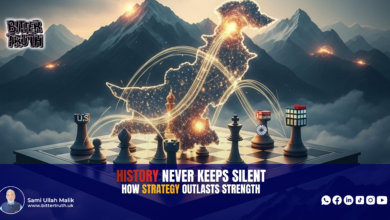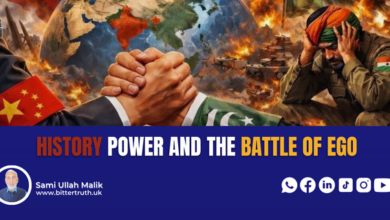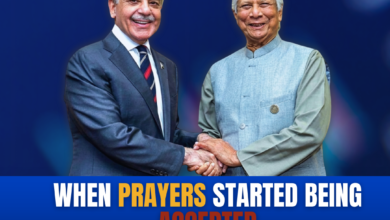Allama Iqbal’s complete belief
After the ground reality like the division of the subcontinent, now trying to deny history or distort the shape of historical events by filling these real sketches with lies and malice, misleading the new generation and making them mistrust Iqbal is like spitting on the moon. falls on his face. After the passage of 76 years, why is Nehru’s baseless accusation against Iqbal being repeated that “Iqbal had withdrawn from Pakistan under the influence of socialism in the last period of his life.” Can these accusations change the facts on the ground so that such a united India is established again, where everyday doomsday like Kashmir and Gujarat are inflicted on Muslims?
Go to two and a half! Why is Iqbal, who dreamed of a state like Pakistan, being involved in this accusation? And at the same time, why is such a blasphemous tune being heard in India and Pakistan? Then what is the reason for spreading this lie frequently before the elections of both countries that the rot of intellectuals sitting on TV across the border and here once Then it flared up. Let’s take a peek into the world of facts through the cracks of history:
Pandit Ji wrote his book “Discovery of India” in 1944 while sitting in the jail of Ahmednagar Fort, in which he praised Iqbal’s achievements as a poet and thinker, but while paying tribute to Iqbal, he also It has already been said that Iqbal was a poet, scholar and philosopher and associated with the old feudal system”. Realized the dangers inherent in this proposal. Edward Thomson wrote that during a meeting, Iqbal told him that he had supported Pakistan as president at a meeting of the Muslim League, but he believed that this proposal was harmful to India in general and Muslims in particular. Is. Perhaps he changed his mind or did not give much thought to the issue earlier because it had not gained any importance until then. , was not compatible. In his later life, Iqbal’s tendency towards communalism increased. The great success of the Soviet Union greatly influenced him and changed the direction of his poetry.”
This allegation of Pandit Nehru is completely wrong, ignorant, and malicious. Those who have studied Iqbal’s poetry, philosophy, and politics even less than a cursory, will testify to the truth that the feudal system cannot find a greater enemy than Iqbal. The biggest historical insult to Nehru was that he forgot that three years before his book, Iqbal’s letters to Quaid-e-Azam had been published with a foreword by Quaid-e-Azam. This English book must have been overlooked by Nehru. . The long letter of May 28, 1937 included in this book is also included in which Nehru’s “Godless Socialism” is also discussed and it is said that Muslims are on one side, Hindu society itself is also “Godless Socialism”. will never accept. While rejecting Panditji’s socialism, Iqbal told Quaid-i-Azam that if the Islamic Shariat is reinterpreted in the light of modern economic ideas, the problem of bread and employment of the Muslim people can be better solved. In order to save the Muslim from the torment of poverty, it is also necessary that the Muslims should have a separate legislative assembly and this assembly can be established in a separate independent state instead of a united India. The contents of this letter are calling out from the language of the present:
First: Iqbal prefers the economic system of Islam to Nehru’s “godless socialism”.
Second: To implement the economic system of Islam in the context of the modern era, the establishment of a separate Muslim state is necessary.
Third: Only a few months before his death, he was advising the Quaid-e-Azam to make the creation of Pakistan a political program of the All-India Muslim League.
Fourth: At the end of this letter, he asks Quaid-e-Azam that the time has not come when we should openly declare the establishment of Pakistan as our goal.
Pandit ji deliberately met Allama Iqbal in Javed Manzil along with Mian Iftikhar Uddin three months before Iqbal’s death. He has described in his book “Last two years of Iqbal”. Respected Batalvi writes:
“Pandit Nehru was busy propagating socialism loudly at that time, he had been the president of two sessions of the Indian National Congress and both times in his presidential speeches he had said that the cure for all the ills of India is socialism but No one among the major leaders of the Congress was Pandit Nehru’s co-worker or like-minded in this regard, but Sardar Patel, Raj Gopal Acharya and Satya Murty openly expressed their disagreement with this belief of Pandit Nehru. During the meeting, Dr. asked Pandit Nehru, “How many Congress men are like-minded with you on socialism?” Panditji replied, “About half a dozen.” Dr. There are only half a dozen, and here you ask me to advise the Muslims to join the Congress, so shall I throw ten crore Muslims into the fire for the sake of six men?” Panditji became silent on this.”
Pandit ji hid an important unpleasant incident that happened in that meeting from his people, but Batalvi Sahib has described it.
“There was a conversation going on with these two great people when suddenly Mian Iftikhar Uddin spoke in the middle saying, Doctor! Why don’t you become the leader of the Muslims? Muslims respect you more than Mr. Jinnah if you talk to the Congress on behalf of the Muslims. If you do, the result will be better. Dr. Sahib, who was lying down, got angry on hearing this, and sat up and said in English: “Well, it is a trick that you want to put me up against Mr. Jinnah.” Yes, I want to tell you that Mr. Jinnah is the real leader of the Muslims, and I am his little soldier”. After that, the doctor became completely silent, and the room fell into a very disturbing and painful silence. Pandit Nehru immediately realizing that Mian Iftikhar’s foolish words had angered the Dr Iqbal, and it was futile to continue the conversation any further, he took permission and left.
It is surprising that they easily forgot these unforgettable memories but gave the status of indisputable historical authenticity to the gossip of Edward Thomson, who himself was declared by his colleagues as biased. Edward Thomson was a teacher of Bengali language at Oxford University and also had an academic interest in Indian history. He also came to British India twice as a correspondent for the British newspaper Manchester Guardian. He had close friendships with Gandhi, Rabindranath Tagore, Raj Gopal Acharia, Saradar Patel and Nehru, where he was always active in opposing the Muslim League, never missing an opportunity to passionately advocate for the Congress.
The tradition on which Panditji accused Iqbal is based on the oral conversation between Edward Thomson and Allama Iqbal. This statement of Edward Thomson is clearly proved to be false on the basis of the documentary evidence of the above-mentioned letters of Iqbal to the Quaid-e-Azam as well as the above circumstances and places of the meeting with Iqbal Nehru. Until the end, Iqbal remained devoted to the desire to see his vision of Pakistan manifest in the form of the establishment of Pakistan. He was active as a lowly soldier of Quaid-e-Azam and advised the Muslims of India that instead of praying for my life, pray for the long life of Muhammad Ali Jinnah, only Jinnah could bring the boat of the nation to the desired shore. has the ability It is not known why these things were erased from Panditji’s mind or why he did not consider it appropriate to include these unpleasant things in his book as a denial of his political ideology?
The eyes are high, the speech is kind, the heart is full
This is the route for the caravan
The only reason for this was that Allama Iqbal always used to say that the blessed saying of my Prophet ﷺ is that the best among you is the one who has the best morals. That is why, despite ideological differences, relations of mutual respect always existed between Allama Iqbal and Nehru. In 1933, Nehru criticized the thinking and behaviour of the Muslim delegates at the Round Table Conference in London. Iqbal was surprised by Nehru’s silence in support of Gandhiji’s attitude because Iqbal was present at the conference, but Nehru was not. Congress was represented by Gandhiji.
On his return, Gandhiji said that he had personally accepted all the demands of the Muslims, but due to political reactionism, the Muslims failed the conference. Nehru came to Gandhiji’s words and made a very strong political statement against the Muslim delegates, so Allama Iqbal wrote a letter to Nehru in refutation of Gandhiji’s accusation, see Allama’s morals:
“I have always appreciated Pandit Jawaharlal Nehru’s sincerity and Candor. His latest statement in reply to the Maheshbhai protestors exudes sincerity, which is rare among Indians today, but it seems that the last three years have the basis of Panditji’s research on the behaviour of the delegates participating in the Round Table Conferences held in London is based on a bias”.
Exposing said that “Gandhiji had given an indication of accepting the demands of the Muslims personally, but at the same time he had also made it clear that he could not give a final guarantee that the executive council of the Congress would also accept these demands. At the same time, he also told that the Congress would never agree to give him full authority in relation to these demands, as if Gandhi had rejected all the demands of the Muslims. Ji’s second unfair condition was that the Muslims should give up their support for specific demands of the untouchables, but the Muslims had angered the racist Gandhi Ji by refusing to give up their support to the untouchables”. Therefore, in his letter, he raised this question:
“How could Pandit Jawaharlal Nehru, given his staunchly socialist views, support this humane condition? At least it does not give him the luxury of accusing Muslims of being reactionary in political matters. In that case, he People who understand well the sectarian motives of the Hindus would be right to conclude that Panditji is an active member in the campaign launched by the Hindu Mahasabha against communal judgment.”
Nehru’s second charge against Muslims was that Muslims are against Indian nationality. In response to this, Allama Iqbal said:
“If by nationalism he meant that different religious communities should be united in a vital sense, then I am guilty of rejecting this idea of nationalism. I would like to put a simple question to Pandit Nehru, when Until the majority nation does not accept the minimal protections of the minority of ten crores which it considers necessary for its survival, nor does it accept the decision of the arbitrator, but continues to raise the claim of single nationality in which only its own benefit is gained. How can India’s problem be solved? It leaves only two possibilities, either the majority Indian nation will have to accept that it will forever remain the agent of British imperialism in the East, or else the country will have to accept religious, historical and in view of the civilized conditions, it will have to be divided in such a way that there is no question of elections and communal problem in the present form”.
This statement of Allama Iqbal given in the answer must have passed through Nehru’s eyes. From the first day to the last, Iqbal’s progressive, broad-minded, and humanitarian creed is prominent in this statement. This statement is not a negation of the concept of Pakistan, but an affirmation. In such a case, Nehru’s saying that Iqbal had abandoned his concept of Pakistan after 1930 does not seem to be based on honesty but is equivalent to putting a veil of prejudice on the historical fact. Let’s ask some more from authentic historical references:
When Nehru welcomed the promotion of patriotism and secularism in three articles on the situation in the world of Islam in the “Modern Review” (Calcutta), Iqbal also in the “Modern Review” (Calcutta) responded by Panditji. Did the equipment to change the intellectual error into the right intellectual. At the beginning of his long essay, Iqbal said: “I do not wish to conceal from Panditji and the readers that Panditji’s essays have created in my mind a painful agitation of feelings. The views expressed reveal a mentality which I find difficult to attribute to Panditji. He does not in his heart like the religious and political stability of Indian Muslims. have been crushed, they do not care that the Muslims of North-West India should develop a sense of independence”.
Readers! Just consider that Iqbal’s analysis that “Panditji’s political imagination has crushed the sense of reality” proved the truth very quickly. He appeared in the service of Abul Kalam and started advising him to accept the concrete facts, the reality of the establishment of Pakistan. Maulana Azad in his book “India Wins Freedom” revealed:
“After a few days Jawaharlal came to see me again. He began with a long preamble in which he emphasized that we should not indulge into wishful thinking, but face reality. Ultimately he came to the point and asked me to give up opposition to partition.”
Through their votes in the 1946 elections, the Muslims of India made the political dreamers of Nehru and Gandhi realize the realities of life. Years ago, Iqbal drew Nehru’s attention to these realities and said, “The requirement of political tact is this.” That instead of running away from the facts of life, we should look them in the eyes and try our claws on them”. In his article under review Allama Iqbal also expressed his opinion bluntly on the question of separate Muslim nationality. Iqbal shed light on the political creed of the Muslims of India in these words:
“If nationalism means patriotism and sacrificing one’s life for an honourable country, then such nationalism is part of the faith of Muslims. This nationalism clashes with Islam when it becomes a political concept and human unity. It claims to be the fundamental principle of Islam and demands that Islam recede into the background of personal belief and not remain as a vital element in national life. The question of separate Muslim nationhood arises only in these countries. Where Muslims are in minority and where nationality demands that they erase their identity. In countries where Muslims are in majority, Islam harmonizes with nationalism because here Islam and nationality are practically one and the same thing. I am sure. I can also say that the Muslims of India will not be a cultivator of any political ideology that will destroy their cultural unity. If their cultural unity is preserved, we can trust that they will create harmony in religion and patriotism. Will take it.”
Allama Iqbal’s belief turned out to be absolutely correct, the Islamists of India eventually proved wrong the political concept of united Indian nationhood and established Pakistan through democratic process. Their cultural unity was secured and there was no contradiction between love for Islam and love for the country in Pakistan. Now our religion is Islam, and our country is Dar Us Salaam and on the other hand, you can judge Nehru’s authenticity from the fact that he admitted in writing in front of the whole world that he would give Kashmiris the right to self-determination, but he himself deviated from his writing and violated this promise. The whole world has seen the duplicity of his whole personality!
May the name of my Lord be true.
Thursday 27 December 2023
London






